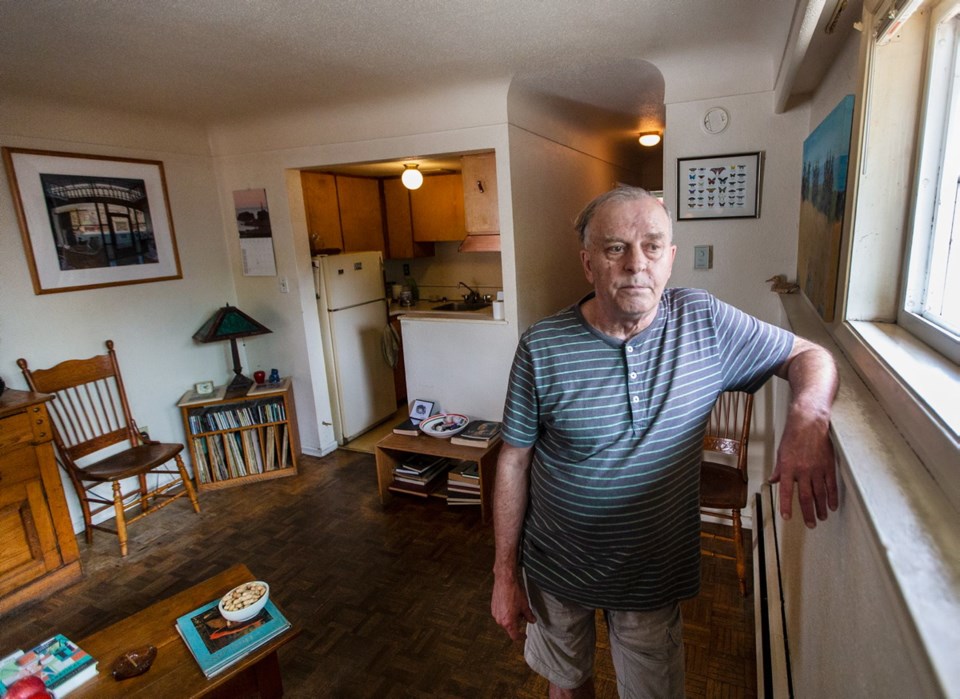A Fairfield senior facing eviction is set to have his hearing before the Residential Tenancy Branch today, despite a statement by the building’s landlord that the eviction was served in error. The tenants advocacy group representing the man said the admission that the evictions were served in error could have implications for other tenants who did not fight their evictions.
Martin Twocock, a 71-year-old pensioner, received an eviction notice May 30, asking him to vacate the suite by Sept. 30 so the landlord can renovate.
Twocock was told he would have first right of refusal for the one-bedroom apartment, but at nearly double his current rent of $728 a month.
Tenant-advocacy group the Together Against Poverty Society has raised concerns about a string of renovictions at two neighbouring apartment buildings, 575 Vancouver St. and 1009 Fairfield Rd. since they were acquired by Headwater Projects in April 2017.
TAPS also helped tenants fight eviction notices when in January 2017 the company served mass eviction notices to residents of a 32-unit building at 2626 Cook St., the first Victoria building purchased by Headwater.
After Twocock shared his story with the sa╣·╝╩┤л├╜, the building’s owner, Vancouver-based Headwater Projects, said eviction notices at both buildings were served “in error.“ A company spokesman said in an email the matter had been “rectified,” but did not elaborate.
Twocock said Monday he hasn’t heard any updates from his landlord and he’s still getting ready for his hearing before the Residential Tenancy Branch today.
“On the one hand, for the media, Headwater is saying the eviction notices were in error, but nobody has told [me] that,” he said. “If Headwater says they were given in error, why the hell haven’t they called me to tell that?”
Headwater did not respond to requests to elaborate on how the errors occurred or whether Twocock’s eviction notice still stands. Both buildings are managed by Brown Bros. and property manager Tasha MacIntyre, who signed Twocock’s eviction notice, also did not return calls.
Emily Rogers of TAPS could also not get an explanation from the landlord or the property managers.
The admission that evictions were served in error could have implications for tenants who accepted the evictions without appealing to the Residential Tenancy Board, Rogers said.
“If this is an error, I’m curious to know how the landlord plans to account for this mistake in regards to the others who have left their homes,” Rogers said.
Renters evicted by landlords in “bad faith” can be awarded 12 months worth of rent, under changes to the Residential Tenancy Act introduced by the NDP government in April. Previously, tenants only received two months worth of rent for such an eviction.
Rogers said it would be up to the Residential Tenancy Branch to determine if the evictions already carried out were in bad faith.
“Even if you received the eviction notice, accepted it and moved out, there could be some compensation,” she said.
Mike Large, a lawyer who lives in the Fairfield Road building, helped some neighbours fight their evictions, including Jenny Uhrig. Her eviction notice was cancelled last week by the Residential Tenancy Branch, which found that the landlord failed to provide evidence that the renovations require the unit to be vacant.
Large said he was “bewildered” by the claim that the evictions were served in error, noting Uhrig had to fight her cause before an arbitrator who considered hundreds of pages of evidence.
“The claim that the service of notice on these two or three tenants was some kind of inadvertent accident stretches all credulity,” he said.



